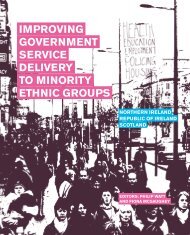4858 Mental Health Report - National University of Ireland, Galway
4858 Mental Health Report - National University of Ireland, Galway
4858 Mental Health Report - National University of Ireland, Galway
You also want an ePaper? Increase the reach of your titles
YUMPU automatically turns print PDFs into web optimized ePapers that Google loves.
Collaborative Practice and Policy<br />
Respondents were also asked about the barriers to cross-border working. Again<br />
they were given a number <strong>of</strong> items and responses were collapsed into agree,<br />
disagree or uncertain. The results can be seen in Table 3:<br />
Table 3: Barriers to Cross-border Working<br />
Barriers to Cross-border Working % Agree % Disagree % Uncertain<br />
Resource constraints 81.6 13.2 5.2<br />
(geographical spread, distance, time etc) (n=31) (n=5) (n=2)<br />
Issues <strong>of</strong> shared ownership 62.2 18.9 18.9<br />
(n=23) (n=7) (n=7)<br />
Differences in the structure and working 76.9 12.8 10.3<br />
practices <strong>of</strong> the two health systems (n=30) (n=5) (n=4)<br />
Building <strong>of</strong> trust between cross-border 62.8 20.0 17.2<br />
partners (n=22) (n=7) (n=6)<br />
Uncertainty <strong>of</strong> funding 79.5 2.6 17.9<br />
(n=31) (n=1) (n=7)<br />
Different currencies 33.3 56.4 10.3<br />
(n=13) (n=22) (n=4)<br />
Political and legal barriers 63.2 18.4 18.4<br />
(n=24) (n=7) (n=7)<br />
There was a little less consensus between the respondents with regard to the<br />
barriers to cross-border working. The barriers agreed with by the majority <strong>of</strong> the<br />
respondents were resource constraints (81.6%), uncertainty about funding<br />
(79.5%) and differences in the structure and working practices <strong>of</strong> the two health<br />
systems (76.9%). Only 33.3% (n=13) agreed that the different currencies in the<br />
two jurisdictions could be seen as a barrier. Issues <strong>of</strong> shared ownership (18.9%),<br />
political and legal barriers (18.4%) and uncertainty <strong>of</strong> funding (17.9%) had the<br />
highest level <strong>of</strong> ‘uncertain’ responses.<br />
Respondents were asked to rate on a scale <strong>of</strong> 1 to 10, where 0=<strong>of</strong> no importance<br />
and 10=<strong>of</strong> great importance, the importance <strong>of</strong> evaluating the effectiveness <strong>of</strong><br />
the collaborative aspect <strong>of</strong> cross-border working. The mean result was 8.69<br />
(sd=1.52), indicating that respondents felt that evaluation was very important.<br />
Respondents were then asked what would help their organisation to evaluate the<br />
effectiveness <strong>of</strong> the collaborative aspect <strong>of</strong> cross-border working. The supports<br />
most commonly cited were time, training, and a clear agreed definition <strong>of</strong> the<br />
aims and objectives <strong>of</strong> the collaborative aspect. Also mentioned was access to<br />
existing models and information, including access to database and population<br />
studies. Funding was also mentioned by many respondents as being a support<br />
that would help the organisation evaluate this type <strong>of</strong> work.<br />
70
















